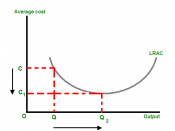Introduction
Once the companies are fulfilled with the saturation of the existing markets, they will expand the businesses abroad. Not only change the structure of the companies, but also the roles and responsibilities of people in the organizations. The form which the companies will be applied depends on many factors such as management, skills and expertise, and resources. The companies might focus on integration, disintegration, or merging both of them; however, they must face many challenges to optimize their objectives.
The purpose of this essay is, firstly, to explain the concept of global expansion. Then the contrasting forces of integration and disintegration will be presented. Thirdly, it provides the transformation in which a diversified MNC becomes a fully integrated global enterprise. Lastly, the implications for international managers as restructuring redefine power and hierarch will be stated.
The concept of global expansion
Hoffman and Schniederjans (1994) state that global expansion provides the ability to access the new markets and opportunities to utilize economies of scale.
The reason why the companies expand into the global market is the saturation of the existing markets that the firms operate. However, the companies must adapt with various environments, geographical separation, cultural and national differences, and variations in business practices between headquarters and overseas offices.
Bartlett, Ghoshal and Birkinshaw (2004, pp. 2-7) provide that there are three motivations that influence the companies to expand their business to overseas market. The first motivation is the need to secure key supplies. For example, Aluminum producers needed to ensure their supply of bauxite so they went abroad to develop rubber plantations. Another motivation for internationalization is market-seeking. This motivation is particularly strong in companies that have the competitive advantages related to their technology or brand recognition. Companies such as Nestle, Bayer, and Ford expand internationally because they want to...


